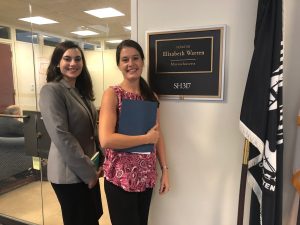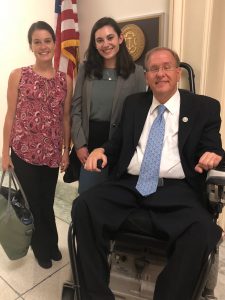May 8, 2019
Students in Science Policy: Congressional Visit Days
Posted by Caitlin Bergstrom
There are many great ways to get a feel for science policy when you’re still a student. AGU offers Congressional Visit Days (CVD) throughout the year, where participants go through a one-day training workshop before meeting with their members of Congress the following day. In collaboration with other geoscience societies, AGU hosts Geo-CVD every fall in Washington DC. Hannah Rabinowitz, a postdoctoral fellow at Brown University studying seismology, participated in Geo-CVD in September 2018 meeting with six offices of Rhode Island and Massachusetts legislators. Laura Lyon, AGU’s Fall 2018 Public Affairs intern, spoke with Hannah about her experience as a Geo-CVD participant.
What science policy experience did you have before Geo-CVD?
“Geo-CVD was my first science policy event. I had previously attended policy sessions at the AGU Fall Meeting just to try to learn a little bit more about what people think about in terms of addressing policy questions related to natural hazards.
I have been involved in STEM education and public outreach programs since my first year of graduate school. This started out through involvement in an event called Girls’ Science Day at Columbia University where all the STEM departments get together to arrange lab activities for middle school girls from the New York City area to learn more about science. Through this and other activities such as the Lamont-Doherty Earth Observatory (LDEO) Open House, the Research as Art event that I started at LDEO, and my experience as a teaching assistant, I realized that one of the things that I find exciting is explaining my science to people at all levels. I have continued to be involved in K–12 STEM education initiatives since moving to Providence through the Brown DEEPS Science Teaching and Education Program.”

Hannah (left) and CVD team member Joanna Carey, Assistant Professor of Environmental Science at Babson College, visit Massachusetts Senator Elizabeth Warren’s office during GeoCVD
What inspired you to sign up for Geo-CVD?
“Over the last year or so, I have become more and more interested in trying to apply my scientific expertise to policy making. Having spent years studying earthquakes – focusing on one that caused over 15,000 fatalities and a large amount of environmental and economic damage in Japan – I am really interested in learning more about how natural hazards policy is made and how communities prepare for and respond to risk.
At a more local level, I’m also interested in how science is taught to kids. It’s really through helping people learn how to think critically from a young age that we can have a well-informed population. As I started looking more at science policy opportunities, I realized that the CVD could be a great way to use my interest in science communication to try to get more involved in science-based policy making.”
What did you learn from Geo-CVD?
“I learned a lot about how bills move through Congress – a step up from my previous civics class-level understanding! It was also interesting learning about specific bills that are moving through Congress at the moment. One of the things that I really appreciated was the fact that the geoscience society staff running the CVD were all really open to discussing their personal experiences working on science policy.”
What was an unexpected challenge that you faced during Geo-CVD?
“The style of communicating with legislators and staffers is very different from other science communication that I have done. When you’re teaching science to undergraduates or even to elementary school students, the main goal is to communicate a scientific concept in language that is appropriate to the level of your audience. In the legislative meetings I had to readjust my perspective. Though legislators do want to have access to scientific information, they don’t want a science lesson. They want to know what you are an expert in so if they have questions at a later date about the topic, you are a resource that they can call upon. The main goal is to try to communicate your work as a narrative rather than trying to explain all the science.
The biggest challenge for me was to understand that my own personal experience should be part of that narrative. In my first few legislative meetings, I struggled to think of a way that my research on earthquakes could be relevant to Rhode Island lawmakers. Why would anyone from the Ocean State care about earthquakes? As I got some feedback from my group, I realized that my scientific experience is not limited to earthquakes. Though I was able to have some exciting conversations about induced seismicity and Earthquake Early Warning in one of the meetings, I realized that my experience and interest with STEM education could become a bigger part of my narrative as education is an issue that impacts people from across the country.”
How has Geo-CVD inspired you to pursue science policy?
“Geo-CVD provided me the opportunity to have face-to-face conversations with people who have pursued careers in science policy. Through talking with them as well as through my legislative meetings, I was able to get a much clearer picture of what a career in science policy could look like. One thing that I find very exciting is the opportunity to work on a wide range of issues. Though work in policy does not allow a scientist to dive as deeply into a specific scientific topic as you would do as a research scientist, it does give you the opportunity to try to understand how to balance scientific understanding with economic and social factors in developing policies that can impact our society in a positive way. I think that having scientists at the table in these discussions is essential for ensuring that policies in our country take relevant current scientific consensus into account.”
Interested in participating in a CVD? Visit our site to learn more about the upcoming visit days and other student opportunities, and don’t forget to follow @AGUSciPolicy on Twitter. “Even if you choose not to pursue a career in science policy” says Hannah “these experiences will help you to become a scientist who is more engaged in the political process.”
Laura Lyon is currently pursuing an M.Sc. in Earth Science at McGill University in Montreal, QC.



I deeply enjoyed reading this, as I prepare myself to participate in this year’s visit day tomorrow! Perhaps I can reflect on my experience afterward the way Hannah did! Nice interview.